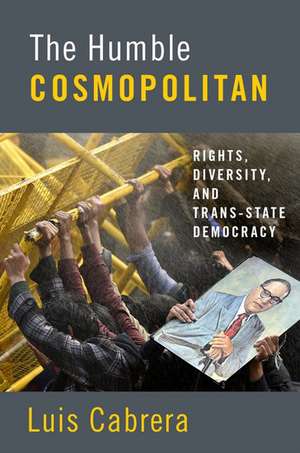The Humble Cosmopolitan: Rights, Diversity, and Trans-state Democracy
Autor Luis Cabreraen Limba Engleză Paperback – 24 ian 2020
| Toate formatele și edițiile | Preț | Express |
|---|---|---|
| Paperback (1) | 217.68 lei 10-16 zile | |
| Oxford University Press – 24 ian 2020 | 217.68 lei 10-16 zile | |
| Hardback (1) | 588.68 lei 31-37 zile | |
| Oxford University Press – 24 ian 2020 | 588.68 lei 31-37 zile |
Preț: 217.68 lei
Nou
Puncte Express: 327
Preț estimativ în valută:
41.65€ • 43.61$ • 34.47£
41.65€ • 43.61$ • 34.47£
Carte disponibilă
Livrare economică 05-11 martie
Preluare comenzi: 021 569.72.76
Specificații
ISBN-13: 9780190869519
ISBN-10: 0190869518
Pagini: 368
Dimensiuni: 234 x 155 x 23 mm
Greutate: 0.5 kg
Editura: Oxford University Press
Colecția OUP USA
Locul publicării:New York, United States
ISBN-10: 0190869518
Pagini: 368
Dimensiuni: 234 x 155 x 23 mm
Greutate: 0.5 kg
Editura: Oxford University Press
Colecția OUP USA
Locul publicării:New York, United States
Recenzii
In the face of rising populist authoritarianism in various parts of the globe, Luis Cabreras important new book forcefully argues for renewed attention to the project of extending rights-based democratic institutions to the global level. Drawing insights from Ambedkars leadership in drafting the Indian constitution, Cabrera shows how a perspective emphasizing what he calls political humility can address the need to recognize and make space for the diversity of regions, languages, and of people more generally, and can enable new ways to challenge instances of overbearing state power. He successfully merges clear-eyed empirical analyses with a nuanced understanding of democratic norms and lays out the core elements of a new global citizenship that would frame existing contexts of belonging. This book is essential reading in these challenging political times.
In The Humble Cosmopolitan, Luis Cabrera develops theory of cosmopolitanism that respects the struggles of the most marginalized for recognition, inclusion, and equality. He offers a justification of grounded normative theorizing and a model for doing so, using the arguments and ideas from interviews he conducted with a broad range of activists associated with dalit rights, to test, expand, challenge, and interrogate his theory. The theory he develops owes an acknowledged debt to these activists and to B. R. Ambedkars constitutional scholarship and dalit activism. The book is a model of responsible political theory.
That India's institutions could offer lessons for global institutions is insufficiently highlighted, but not surprising. That one of the founders of the Indian Union could provide cosmopolitanism with the ethical foundations it needs is more astonishing. Yet, this is what this stimulating book argues, while inviting global thinkers to seek inspiration in B.R. Ambedkars humility-focused political philosophy.
The Humble Cosmopolitan, is a remarkable and outstanding contribution to political philosophy: politically relevant, clearly argued, with scrupulous attention to possible objections to the position he presents.Luis Cabreras contribution is not only a prescription, but part of the remedy.
In The Humble Cosmopolitan, Luis Cabrera develops theory of cosmopolitanism that respects the struggles of the most marginalized for recognition, inclusion, and equality. He offers a justification of grounded normative theorizing and a model for doing so, using the arguments and ideas from interviews he conducted with a broad range of activists associated with dalit rights, to test, expand, challenge, and interrogate his theory. The theory he develops owes an acknowledged debt to these activists and to B. R. Ambedkars constitutional scholarship and dalit activism. The book is a model of responsible political theory.
That India's institutions could offer lessons for global institutions is insufficiently highlighted, but not surprising. That one of the founders of the Indian Union could provide cosmopolitanism with the ethical foundations it needs is more astonishing. Yet, this is what this stimulating book argues, while inviting global thinkers to seek inspiration in B.R. Ambedkars humility-focused political philosophy.
The Humble Cosmopolitan, is a remarkable and outstanding contribution to political philosophy: politically relevant, clearly argued, with scrupulous attention to possible objections to the position he presents.Luis Cabreras contribution is not only a prescription, but part of the remedy.
Notă biografică
Luis Cabrera is Associate Professor in the School of Government and International Relations and Griffith Asia Institute at Griffith University in Brisbane, Australia. He has published widely on issues of global justice and ethics, including global citizenship, migration and individual rights, and on the development of more democratically accountable regional and global political institutions. He has conducted related field research in India, Mexico, Southeast Asia, several European Union countries, Turkey, and the United States.
